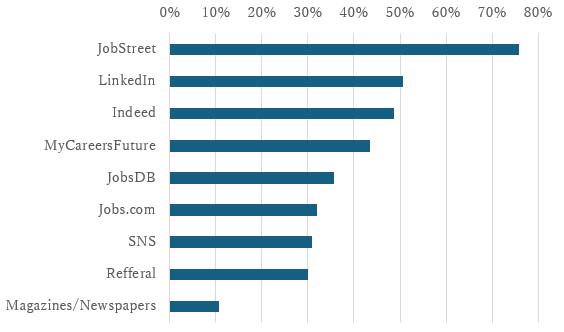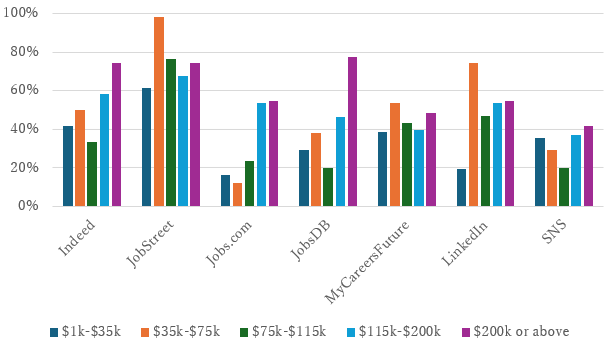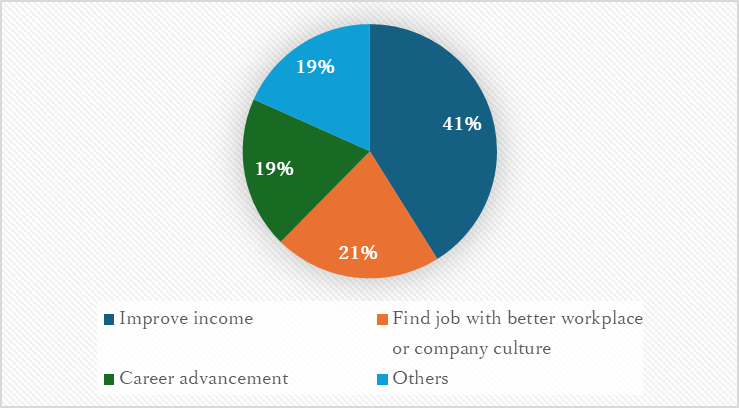
Welcome to the Jobcube blog!
In this blog, we will conduct an in-depth analysis of job portal usage trends in the Singaporean market, where Jobcube has recently expanded. Singapore is a highly diverse country with a large multinational workforce. In such an environment, what types of job portals do job seekers use?
Based on the data we collected, we will explore job portal usage trends by income level, age group providing a real insight into Singapore's labor market.
Survey Details:
-
Target Group: Men and women aged 18–69 in Singapore (valid responses: 202)
-
Survey Method: Online survey
-
Survey Period: Wednesday, December 25, 2024
1. Job search platforms used when looking for a job (multiple answers allowed)
Graph1:Most Popular Job Search Platforms in Singapore

In our analysis of job portal usage in Singapore, we found that the three most widely used platforms are JobStreet, LinkedIn, and Indeed. These platforms dominate the job search market, with a significant portion of job seekers relying on them to find employment opportunities.
When examining the balance between online and offline job searches, we found that only 5% of respondents do not use online platforms at all.
The most frequently used job boards are JobStreet, Indeed, and MyCareersFuture, each offering unique features and advantages for job seekers.
JobStreet stands out as a major player in the market, with over 60,000 job postings available at any given time. In addition to job listings, it provides career guides and an integrated application system, allowing candidates to complete their job applications directly through the platform. This comprehensive functionality makes it a preferred choice among job seekers in Singapore.
On the other hand, MyCareersFuture has also gained significant traction in recent years. Despite being a relatively newer entrant, it now hosts over 80,000 job postings and has rapidly increased in popularity. This surge in recognition has positioned it as one of the most frequently used job boards in Singapore, making it a strong competitor in the job search landscape.
There were no significant differences in job platform usage based on nationality or industry. However, in terms of age groups, there was a tendency for individuals aged 60 and above to use Indeed less frequently.
One major difference from the previous U.S. survey is that LinkedIn was the most commonly used job platform in the U.S. This indicates that, at present, job boards are still more commonly used than LinkedIn in Southeast Asia.
2. Online Job Portal Usage Trends by Annual Income (Multiple Answers Allowed)
Graph2:Preferred Job Platforms Based on Income Bracket

"Indeed," "Jobs.com," "JobsDB," and "LinkedIn"
The higher the income level, the higher the usage rate of these platforms. However, LinkedIn is actively used even among the $35k–$75k income group, suggesting that job seekers in this bracket may be leveraging the platform for career advancement.
According to occupation-specific data, LinkedIn has a 53% usage rate among office workers, compared to 38% in other job categories. This indicates that occupation type may have a greater impact on LinkedIn usage than income level.
"JobStreet," "MyCareersFuture," and "SNS"
These platforms are consistently used across all income levels. In particular, JobStreet has an almost 100% usage rate among the $35K–$75K income group, highlighting its broad appeal among job seekers in this range.
3. Motivation for Choosing a Job (Single Answer Allowed)
Graph3:Reasons for Choosing a Job

The top three motivations for choosing a job are improving income, finding a job with a better workplace, and career advancement, with "improving income" accounting for nearly half of all responses. Since many people prioritize financial stability and salary increases when changing jobs or selecting a new position, job portals should ensure that salary information is displayed as clearly and accurately as possible.
Among the "Others" category, notable responses included "securing more stable employment" and "starting work in a new industry."
Key Findings from the Survey
This survey has highlighted several important insights regarding job search trends in Singapore:
-
Job boards dominate job searches in Singapore, with approximately 90% of job seekers using them. The most frequently used platforms are JobStreet, Indeed, and MyCareersFuture.
-
LinkedIn is also widely used, ranking just behind JobStreet. However, it is not typically used as a standalone job search platform. Instead, office workers, in particular, tend to use LinkedIn in combination with multiple job boards. This suggests that job boards remain the primary source of job listings in Singapore, while LinkedIn is more commonly used for checking company reputations and networking.
-
Online job platform usage varies by income level. Indeed usage increases as income rises, whereas JobStreet maintains high usage across all income groups. Although LinkedIn is often perceived as a platform for high-income professionals, it was actually most actively used by those in the $35k–$75k income range. These findings suggest that higher-income individuals tend to leverage multiple job platforms and explore various job search methods.
-
"Improving income" was the top motivation for job selection, emphasizing the importance of clearly displaying salary information on job boards. Platforms should consider implementing features that estimate average salaries by industry and job type to better support job seekers.
Message from Jobcube
Are you making the most of the right job platforms for your job search in Singapore? Finding the best platform for your desired industry and career goals is key to a successful job hunt.
At Jobcube, we are committed to leveraging the insights from this survey to help you discover better job opportunities. We will continue to enhance our support for job seekers, so stay tuned for exciting developments ahead!
About Jobcube, Inc.
Jobcube, Inc. is a wholly owned subsidiary of Kakaku.com, Inc. established in Delaware, USA in 2023. It operates an online job board that connects employers and jobseekers. Kakaku.com, Inc., the parent company, is a Japanese Internet service provider founded in 1997 and operates one of the largest web services in Japan in various fields, including the product comparison site "Kakaku.com" and the restaurant search and reservation service "Tabelog”. Since 2015, the company has been operating "Kyujin-Box," a job search service, which has received favorable reviews for its ability to search a wide range of job information in bulk according to many and varied needs, and it boasts users starting from young adults though to senior citizens.